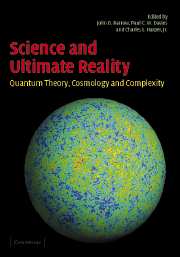Book contents
- Frontmatter
- Contents
- List of contributors
- Foreword
- Editors' preface
- Preface
- Acknowledgments
- Part I An overview of the contributions of John Archibald Wheeler
- Part II An historian's tribute to John Archibald Wheeler and scientific speculation through the ages
- Part III Quantum reality: theory
- Part IV Quantum reality: experiment
- Part V Big questions in cosmology
- Part VI Emergence, life, and related topics
- Appendix A Science and Ultimate Reality Program Committees
- Appendix B Young Researchers Competition in honor of John Archibald Wheeler for physics graduate students, postdoctoral fellows, and young faculty
- Index
Foreword
Published online by Cambridge University Press: 29 March 2011
- Frontmatter
- Contents
- List of contributors
- Foreword
- Editors' preface
- Preface
- Acknowledgments
- Part I An overview of the contributions of John Archibald Wheeler
- Part II An historian's tribute to John Archibald Wheeler and scientific speculation through the ages
- Part III Quantum reality: theory
- Part IV Quantum reality: experiment
- Part V Big questions in cosmology
- Part VI Emergence, life, and related topics
- Appendix A Science and Ultimate Reality Program Committees
- Appendix B Young Researchers Competition in honor of John Archibald Wheeler for physics graduate students, postdoctoral fellows, and young faculty
- Index
Summary
I am immensely pleased with this wonderful volume, and humbled by it. It demonstrates the incredible vibrancy of fundamental physics, both theoretical and experimental, as a new century gets under way. Just as unimagined vistas of the physical world were revealed in the early years of the twentieth century, so too we are encountering unimagined wonders a hundred years later. If there is an end to physics, an end to understanding the reasons for existence, it lies far in the future.
Who would have guessed in 1925, or even in 1950, that quantum mechanics would remain for so many decades such a fertile field of research? Who would have guessed then that its reason for being would remain mysterious for so long? Like many of the authors in this book, I remain convinced that some deeper reason for quantum mechanics will one day emerge, that eventually we will have an answer to the question, “How come the quantum?” And to the companion question, “How come existence?”
And who could have guessed in 1975 – when the black hole was coming to be accepted, when an explanation of pulsars was at hand, when primordial black-body radiation had been identified – who could have guessed then that an incredible confluence of deep thinking and stunning experimental techniques would push our understanding of cosmology – of the beginnings, the history, and the fate of the universe – to its present astonishing state?
- Type
- Chapter
- Information
- Science and Ultimate RealityQuantum Theory, Cosmology, and Complexity, pp. xi - xiiPublisher: Cambridge University PressPrint publication year: 2004



